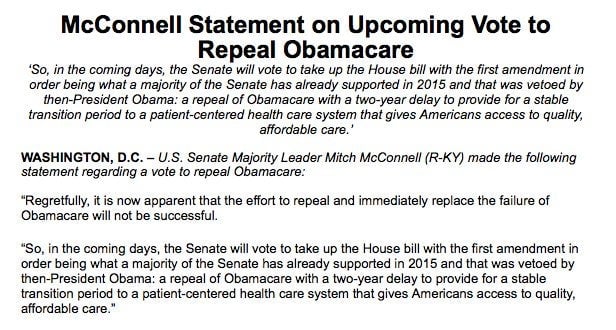What happens to US health care and the federal deficit if Obamacare is repealed completely?
Faced with crumbling support for the health care bill in the Senate that would repeal and replace the Affordable Care Act, majority leader Mitch McConnell said late Monday he would force an even more extreme vote—eliminating the act entirely and giving the Senate two years to come up with a replacement plan.


Faced with crumbling support for the health care bill in the Senate that would repeal and replace the Affordable Care Act, majority leader Mitch McConnell said late Monday he would force an even more extreme vote—eliminating the act entirely and giving the Senate two years to come up with a replacement plan.
In the coming days, the Senate will vote on a measure that a majority of senators had already supported in 2015 and was vetoed by Barack Obama, McConnell announced: “a repeal of Obamacare with a two-year delay to provide for a stable transition period to a patient-centered healthcare system.”

It’s a politically motivated bit of theater that has little chance of passing. Last time this exact same bill came up for a vote, 52 senators, all Republican, voted yes on it. McConnell appears to be challenging Republican senators who threatened not to vote for the current heath care bill because they said it didn’t go far enough—asking for their vote to kill the Affordable Care Act entirely, no matter how unpopular the idea is.
On Tuesday, several Republican senators who voted to repeal Obamacare in 2015, including Rob Portman from Ohio and Shelley Moore Capito from West Virginia said they could not support a repeal now, because they were worried about the impact on their constituents. Susan Collins, the Republican senator from Maine who didn’t voted against the repeal in 2015 has not changed her stance, and other defections are likely.
Because Republicans have been trying to destroy the Affordable Care Act for years, the Congressional Budget Office has already examined this approach. Back in June of 2015, the CBO analyzed (pdf) what repealing the Affordable Care Act without replacing it with something else would actually look like for American citizens over the next 10 years. Here are the main takeaways:
- A boost in labor supply would increase GDP by 0.7%, reducing the federal deficit by $216 billion over the 2016-2025 time period. But repealing the taxes that fund the bill would also reduce net revenues by $631 billion in the same time period. The net effect would be a $137 billion increase in the federal deficit from 2016 to 2025.
- About 14 million fewer people would be insured by Medicaid, and 18 million fewer would have non-group coverage, for an increase of 32 million uninsured. But the CBO estimated eight million more would have employment-based coverage if the act were repealed. The net effect would be 24 million fewer people insured from 2016 to 2025.
- Premiums in the “non-group” market, or those purchased directly through the marketplaces or from insurers, would rise 20 to 25% in the first year that the ACA was eliminated, according to a later CBO analysis (pdf), and double by 2026. The net effect is premiums could rise 100% for some users by 2026.
The numbers of uninsured is similar to the effect of the “repeal and replace” bills written by the House and Senate this year.
In daring his colleagues to vote to scrap the act entirely, McConnell is following the advice of US president Donald Trump. For his part, Trump applauded the new approach today in a tweet, saying Congress should “let Obamacare fail and then come together and do a great healthcare plan.”
An earlier version of this article incorrectly said that the Senate’s “repeal only” bill would need 60 votes to pass. The Senate can use the fast-track legislative procedure known as “reconciliation” to pass the bill, which means it only needs 50 votes plus a tie-breaking vote from vice president Mike Pence to pass.